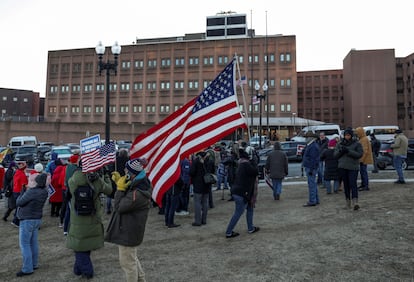Trump pardons 1,500 people prosecuted for assault on the Capitol and commutes the most serious sentences
On his first day in the Oval Office, the president decrees a ‘full, complete and unconditional’ pardon that includes January 6 prisoners who committed violent acts


Just hours after being sworn in at a ceremony held indoors due to the low temperatures in Washington, Donald Trump, the new president of the United States, signed an executive order on Monday to pardon or commute the sentences of 1,500 people convicted or prosecuted for participating in the assault on the Capitol on January 6, 2021. In addition, he commuted six sentences, and it is understood these carried the most serious sentences. The Capitol riots took place during the final days of Trump’s first presidency and at the end of a rally in which the outgoing president encouraged his supporters to storm Congress. It was one of the darkest days in the recent history of democracy in the United States.
The new president had been stating for months that he would do so, as he considers what happened on that infamous January day in Washington to be an “act of love,” and those who ended up before the courts for their acts of insurrection — some 1,580 people, of whom around 1,200 have been convicted and 650 handed prison sentences — to be “hostages” and “incredible patriots.” In the end, he pardoned those who did not commit violent acts and commuted the sentences of those who committed more serious crimes. He also ordered the end of the proceedings (around 300) against those who have not yet been tried.
It is a “full, complete and unconditional” pardon, Trump said, which “brings to an end,” he added, “a grave national injustice that has been perpetrated upon the American people over the last four years.” The new president referred to the pardonees as “hostages” and said he hoped the inmates would be released “that very night.”
Trump signed the order at a desk that his inaugural event organizers had set up to the left of the stage at Capital One Arena in downtown Washington, where celebrations continued after the swearing-in ceremony held in the Rotunda at the Capitol building, the same spot where the rioters allowed themselves to be photographed and snapped selfies after they managed to breach the security of the U.S. Congress on January 6, and before Trump, who followed the violent spectacle on television, finally told them to go home on social media. One person died in the unrest, and four others who were caught up in the rioting lost their lives in the subsequent 36 hours. Around 150 police officers were injured.
What followed was the “most important case the Justice Department has ever undertaken,” as then-Attorney General Merrick Garland described it. Hundreds of those arrested and charged ended up in federal district court in Washington. The news that Trump was pardoning them was expected, but not the generosity shown by the president, who released such famous and controversial January 6 figures as the leader of the extremist Proud Boys militia, Enrique Tarrio, who was sentenced to 22 years for seditious conspiracy, or Stewart Rhodes, the leader of another ultra-right wing group, the Oath Keepers, who has been behind bars for a couple of years and had another 16 to serve. Rhodes is one of the 14 whose sentence was commuted, as he was considered to have served his time.
Every night for the past 900 days, relatives and supporters of the January 6 prisoners have gathered for a vigil outside the federal jail in which they were held, where they prayed for the fate of their loved ones, swore allegiance to the flag, and connected with the inmates by phone. Monday was no exception, and some of them were present all day, waiting for the big news to come at any moment, given that at a rally on Sunday night Trump had said: “Everybody in this very large arena will be very happy with my decision on the J6 hostages,” he said. “I think you’ll be very, very happy, I would say about 99.9% of this beautiful arena,” which gave cause to speculate that there would be no blanket pardon.
Sign up for our weekly newsletter to get more English-language news coverage from EL PAÍS USA Edition
Tu suscripción se está usando en otro dispositivo
¿Quieres añadir otro usuario a tu suscripción?
Si continúas leyendo en este dispositivo, no se podrá leer en el otro.
FlechaTu suscripción se está usando en otro dispositivo y solo puedes acceder a EL PAÍS desde un dispositivo a la vez.
Si quieres compartir tu cuenta, cambia tu suscripción a la modalidad Premium, así podrás añadir otro usuario. Cada uno accederá con su propia cuenta de email, lo que os permitirá personalizar vuestra experiencia en EL PAÍS.
¿Tienes una suscripción de empresa? Accede aquí para contratar más cuentas.
En el caso de no saber quién está usando tu cuenta, te recomendamos cambiar tu contraseña aquí.
Si decides continuar compartiendo tu cuenta, este mensaje se mostrará en tu dispositivo y en el de la otra persona que está usando tu cuenta de forma indefinida, afectando a tu experiencia de lectura. Puedes consultar aquí los términos y condiciones de la suscripción digital.








































